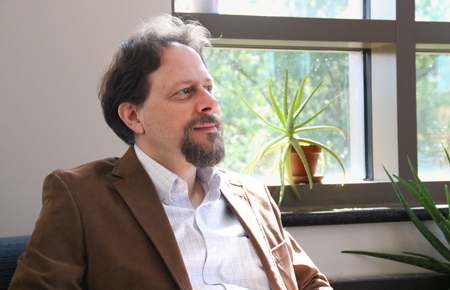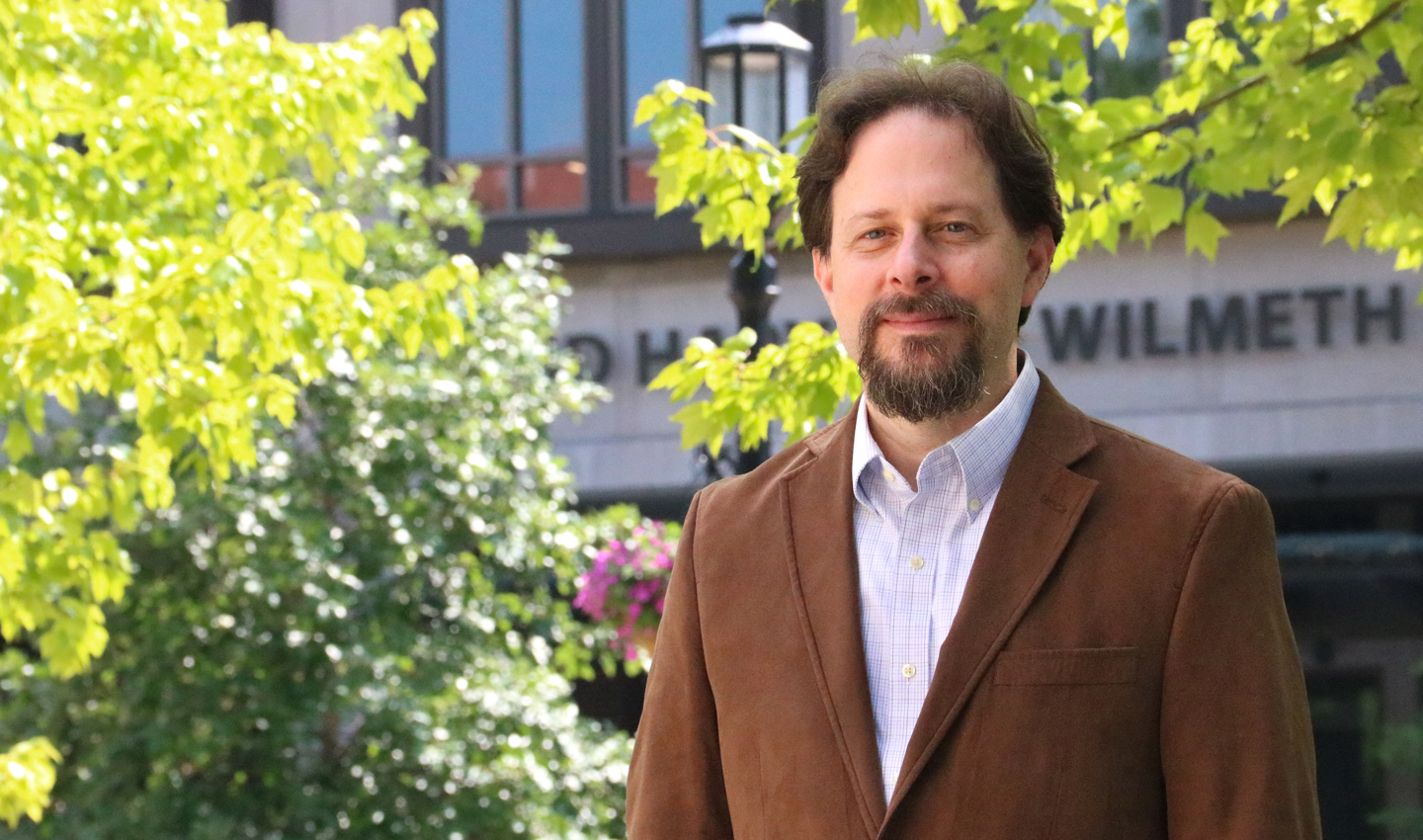Michael Fosmire was a dedicated UW graduate student in physics when he first became interested in science librarianship. He knew little about it, although he spent long hours in the old physics library poring over academic papers. He began asking the librarian there questions: What does this profession mean? How do you get a job like this?
“I was seeing that the role might be more fulfilling than spending my days in a lab,” says the Purdue University librarianship professor and scholar, who, after graduating with his UW master’s in physics, switched academic gears and entered the UW iSchool.
He earned his master’s degree in library science there in 1997. It was a time of transition, with the school moving from strictly library studies to studies in library and information science. Technology was on the rise.
He studied the cultural changes at the school closely. “It was the end of one era and the beginning of another,” says the eminent professor, who heads the Information Studies school at Purdue. “I watched how it worked organizationally and internalized that. It affected how I work as an administrator now: getting consensus, eliciting responses, getting everyone involved in the process, getting them invested in the organization.”
More than 25 years after earning his M.Lib (now Master of Library and Information Science) — years that saw academic journals moving from paper to electronic formats and scientists browsing the Web instead of flipping pages — Fosmire is being honored with a 2023 UW iSchool Distinguished Alumni Award, given to graduates who have made significant and exceptional contributions to the information field.
The honor is well-deserved, say colleagues. They describe him as an excellent, nurturing mentor, a thoughtful collaborator, and an innovative leader. “Michael Fosmire has impacted librarianship in so many ways, here at Purdue University and for the academic library community at large,” says Beth McNeil, dean of Libraries and School of Information Studies at Purdue.
Fosmire joined the prestigious university in West Lafayette, Indiana, shortly after his UW iSchool graduation, taking a “dream job” as the Physics and Earth and Atmospheric Science librarian. Within years, he was heading multiple libraries at Purdue in physical sciences, engineering and technology. Fosmire was encouraged to innovate from the get-go. “We were fairly independent and there was a lot of opportunity to experiment.”
Early on, he began working with colleagues to introduce a more efficient, cross-functional team approach to librarianship across campus, getting different departments talking and working together. “There had been a lot of silo-ing. But we got more conversations happening, more collaborative work and there were fewer frustrations.”

The resourceful leader also helped convert an old, little-used periodical reading room in the engineering library into one of the first active learning centers on campus, with early-generation smartboards and pod seating that encouraged lively small group and whole-class collaboration. “It was incredibly successful. The classroom was booked solid,” says Fosmire.
His iSchool lessons at the UW had emphasized the importance of using studies to determine actual information usage of scientists and engineers and build from that data. It was a holistic, user-focused approach that would be foundational to Fosmire’s work in science librarianship. “You have to understand how serious scientists think and then translate that into how you understand what their information needs are in order to meet them,” he says.
“It helps to 'speak their language,'” he adds.
The iSchool graduate has published extensively in his field, both books and articles, often in strong collaboration with peers. “Michael is extremely creative and superb at problem-solving,” says collaborator Margaret Phillips, associate professor of Library Science and associate head of Information Studies. “He has a high level of intellectual curiosity, which allows him to think more deeply and come up with creative solutions.”
Purdue’s libraries were rebranded the Libraries and School of Information Studies in 2020, reflecting a hybrid mission to combine traditional library services and curricular offerings. Fosmire was named inaugural head. He again put user-centered research to work in discerning student needs and gaps in understanding, conducting interviews, surveys, even a “think-aloud” protocol he discussed in an article titled: “But What Are Students Really Thinking When They Do Research?”
When he asked one group of physics graduate students what they needed information-wise, they told him they didn’t really know how to read a scientific paper or how to make sense of it. He responded by creating an animated tutorial on the subject, soon used widely on campus and picked up by librarians around the world.
“By evolving and expanding our mission, we are keeping libraries relevant and integral to the success of our students, just like the UW iSchool reinvented the librarianship program at the start of my career.”
Fosmire is passionate about boosting students’ information literacy. He describes it as a process, a habit of mind, a way of thinking that gives students critical tools for problem-solving. It’s a far cry from cutting and pasting information from a Web browser for a science paper or turning to unreliable, sometimes nonsensical artificial intelligence for answers. “It took about 30 seconds for AI to be thoroughly a part of the student workflow,” he notes.
To help combat the onslaught of fake science online, Fosmire and his colleagues developed an intervention that teaches students to raise questions about the reliability, accuracy and authenticity of sources. “Making up data is one of the most egregious things we face as science librarians,” he says.
Fosmire and the libraries’ faculty are working to expand the Information Studies curriculum, which includes certificates in geoinformatics, digital humanities and courses in research data management. “By evolving and expanding our mission, we are keeping libraries relevant and integral to the success of our students, just like the UW iSchool reinvented the librarianship program at the start of my career.”
He says he is honored to be recognized as one of the iSchool’s Distinguished Alumni. “It’s pretty humbling to have that kind of recognition. It’s a chance to look back and see what you’ve accomplished — to look at your work as a totality.”
What he sees from that vantage is revealing: it’s not his own accomplishments that make him most proud, he says, but the successes of others he has mentored. “I’ve had a ton of very skilled, motivated and energetic colleagues I’ve been able to work with over the years to publish together and create new programs. We have encouraged risk-taking and trying stuff out to see if it works,” he says.
He wants new librarians to have the same freedom to experiment, to try and fail and try again. “I’ve tried to bring that forward for them, encouraging them to do something interesting, impactful, and to tell me how I can support them.”
